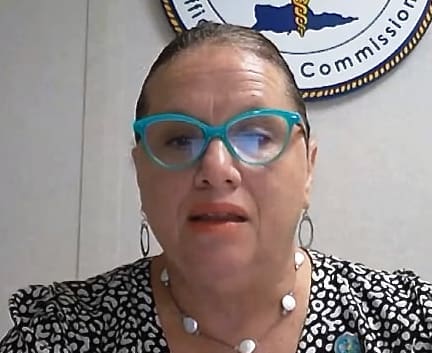
Health Department officials told the Source the territory’s number of vaccinations cited in recent Centers for Disease Control and Prevention and New York Times reports is inaccurate, and explained that while health personnel and medical providers are learning complicated computer programs, the sluggish systems have slowed down reporting.
Last week, the Centers for Disease Control and Prevention, and subsequently the New York Times, ranked the Virgin Islands third last of 59 jurisdictions in administering individual vaccines. According to the Times on Feb. 1 and CDC on Feb. 2, around 6,116 out of 17,074 vaccines had been administered in the territory. The report further stated 4.7 percent of the population has received one dose and 1 percent has been inoculated twice.
The actual number of vaccines given out, according to Monife Stout, director of immunizations for the Department of Health, was 9,609 as of Feb. 1, not 6,116. The reported number of vaccines distributed to the territory is also inaccurate, but she said she doesn’t know what the correct number is.
Those numbers may be inaccurate also because it appears the CDC is assuming the USVI population is around 125,000 people, but most agree the population is far less, closer to 100,000.
Health Commissioner Justa Encarnacion said the department is keeping “close tabs on a daily basis” of everything they are doing until the CDC and DOH statistics agree.
In addition to slowly learning two or three new programs, users faced “a major lag” in the systems that slowed down data reporting.
The main new program Virgin Islanders learned was Tiberius, the federal government’s program that calculates allotments and vaccines to the states and territories.
The second system, the Vaccination Administration Management System, provided by the CDC, tracks the vaccines from the manufacturer to the arm of the recipient, keeps track of inventory and can be used to schedule appointments. Now that DOH and providers are more comfortable with the program, data input should be “closer to where we need to be” by the end of the week, Stout said.
Another system, the local State Immunization Information System – a database to keep track of all vaccines administered in the territory – will be upgraded soon via a government grant, Encarnacion said.
“Once the system is upgraded, then we should be basically on the same level as all the other states and we’ll be able to input our data at a quicker pace.”
The three government programs have been described by others as cumbersome at best. The COVID tracking systems were described in USA Today as a “complex network of state and federal systems,” and a “jumble of interconnected databases” using “first-generation applications along with code for mainframe computers.”
Asked if other states’ numbers are inaccurate as well, Stout said she can’t speak for them, because some are using different reporting systems, but Tiberius and VAMS systems both have experienced delays, she said.
Last week when the Biden administration was trying to assess the total number of vaccines available to the nation, Politico reported that aides “were unable for weeks to access Tiberius.” There were extensive data problems that took weeks to fix, the internet news source added.
Encarnacion said directives now advise all COVID doses to be distributed because DOH has been assured it will receive enough supplies for second doses. She meets weekly with local medical providers and twice a week with national health care providers to learn and share information about the virus and vaccines.
Stout said the federal government has promised 975 doses of Pfizer and 1,600 Moderna doses delivered weekly, and, at some point in the near future, the Health Department be will be sent an additional 900 Moderna doses every week.
Currently, there are around 30 locations for receiving vaccinations throughout the territory. Contact doh.vi.gov for information and hours.
Each pharmacy or physician’s office has limited staff, and more help is needed. The V.I. National Guard, the U.S. Department of Health and Human Services and FEMA have been asked for help inoculating the public, the commissioner said. New staff has been hired locally and DOH personnel are being cross-trained to give shots. Encarnacion said there are also volunteers and donors helping with work and financing.
According to Stout, Plessen and ProHealth on St. Croix and the Red Hook Family Clinic are the busiest private clinics.





